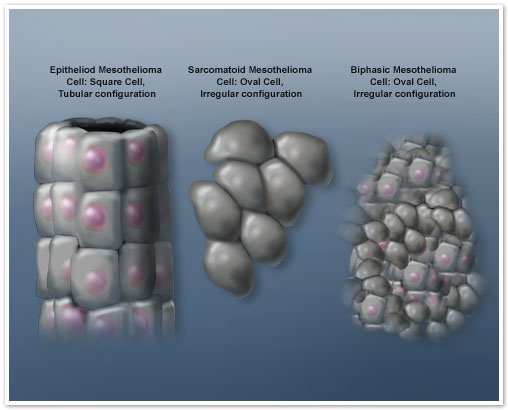Different Types of Mesothelioma
Malignant Mesothelioma is a form of cancer that is most commonly connected with asbestos exposure. In fact the only real known cause for the pathogenesis regarding malignant mesothelioma is asbestos. This cancer affects the areas of the body where mesothelial cells are observed.
Pleural Mesothelioma comprises the most of malignant mesothelioma cases. This is any type of malignant mesothelioma that affects the actual pleura, which is the lining in the lungs. Approximately 70% of all instances of malignant mesothelioma occur from the pleura. As asbestos fibers which can be sloughed off of asbestos containing products get inhaled by humans, these then get lodged from the lining of the lungs. Our body has no capability of physiologically eliminating such fibers. In time, these accumulated fibers will quickly realize they way into the mesothelial cells in the pleura. These asbestos fibers are thought foreign bodies by the entire body. Thus, their presence causes reactive inflammatory processes to take place, which is manifested by pleural thickening, plaque formations, vasculitis as well as effusions. As the disease on, the thickening of the parietal as well as visceral pleura causes the narrowing in the pleural space. In time, both leaves of the pleura rub against 1 another. These processes are manifested since dyspnea, rales and even torso pain or discomfort, fatigue, and fat loss in the patient. Continued hypertrophy of mesothelial cells a result of the assaultive presence of these fibers will likely then result in the formation regarding tumors. On average, it takes about 40 years from exposure to these fibers to the outward exhibition of first symptoms.
Peritoneal mesothelioma comprises about 20 to 25% of malignant mesothelioma cases. This is any type of mesothelioma that affects the mesothelial cellular material of peritoneum. As asbestos fibers come into contact with the mesothelial cells, they impact changes that cause the cellular material to multiply without restraint, also to thicken. Ascites also occurs. Collectively, these cause pressure buildup from the abdominal cavity. This pressure affects another internal organs and causes those to deteriorate. Intestinal obstruction often arises. Thromboses of intestinal veins as well as hypoglycemia, and anemia are popular initial symptoms. Lesions can change from single tumors, small diffuse tumors, or calcified nodules.
Pericardial mesothelioma comprises about 5% of cases of malignant mesothelioma. This can be a least common type of mesothelioma. Along with pericardial mesothelioma, malignant tumors are found on the pericardium, the fibrous tissue sac surrounding the guts. It is speculated that how asbestos fibers travel to the guts is through the lymphatic system or with the cardiovascular patient. As with another types of mesothelioma, asbestos fibers cause the cells in the pericardium to thicken. This thickening affects pressure on the chambers of the heart. Consequently causes severe shortness of inhale, chest pain, as well as thromboses from the veins. In time, the thickening also causes the mesothelial cells to undergo unrestricted division and growth, ultimately causing the formation of tumors. Just like the other types, the excess pressure buildup on the tumor growth puts pressure on the heart contributing to congestive coronary heart failure.
''Sharing Is Caring''



No comments:
Post a Comment